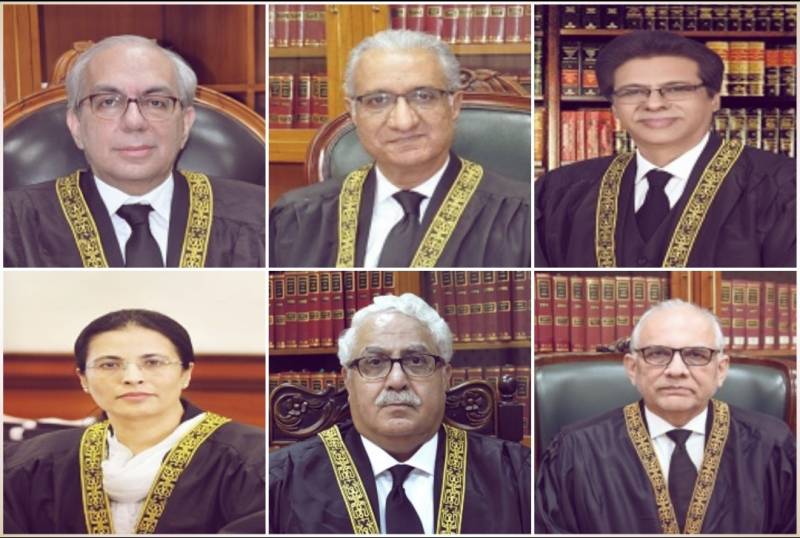
As the crisis facing Pakistan's judiciary deepens day by day, a six-member bench of the Supreme Court of Pakistan (SC) - formed to deliberate on Justice Qazi Faez Isa’s order freezing all the suo motu notices - "closed the case" after a 5-minute hearing today (Tuesday).
This larger SC bench included Justice Ijaz ul Ahsan, Justice Munib Akhtar, Justice Sayyed Mazahar Ali Akbar Naqvi, Justice Muhammad Ali Mazhar, Justice Ayesha Malik, and Justice Syed Hasan Azhar Rizvi.
Presenting arguments before the court, PMDC's counsel Afnan Kundi said that 20 additional numbers were given under the rules till 2018. In 2021, new rules were made and the additional marks were no longer awarded. "The issue of 20 additional marks is practically over," Kundi said.
Justice Munib Akhtar remarked that the suo motu notice in the instant case was taken in 2022, and after the 2021 Rules, the notice became ineffective and as such stood disposed of.
This bench was formed earlier today to review the order passed in Suo Motu Case No. 4 of 2022. The order was a 2-1 majority verdict passed by a 3-member bench, with Justice Aminuddin Khan concurring with the majority view, while Justice Shahid Waheed dissented.
After hearing arguments in Suo Motu Case No. 4 of 2022 pertaining to the grant of additional 20 marks to Hafiz-e-Quran pre-medical candidates for admission into MBBS/BDS degrees, Justice Qazi Faez Isa had issued an order urging that all suo motu hearings be halted until rules were devised to structure the application of the Supreme Court's extraordinary jurisdiction under Article 184(3).
It may be noted that an attempt was made to nullify this judicial order via a Supreme Court circular, which ended up in the removal of SC registrar Mr. Ishrat Ali in publicly embarrassing circumstances.
Analysts say the crisis at the apex court, including the apparent fragility of the benches formed to hear cases, points to "grouping" within the judges and an overall crisis of confidence in the judicature.
The government has urged the Chief Justice of Pakistan (CJ) Justice Umar Ata Bandial to call a full court composed of all 15 apex court judges in order to resolve the ongoing constitutional crisis. Earlier, interior minister Rana Sanaullah said that the government was considering sending references against three SC judges including the CJ to the Supreme Judicial Council (SJC), the top disciplinary body of the Pakistani judiciary.
This larger SC bench included Justice Ijaz ul Ahsan, Justice Munib Akhtar, Justice Sayyed Mazahar Ali Akbar Naqvi, Justice Muhammad Ali Mazhar, Justice Ayesha Malik, and Justice Syed Hasan Azhar Rizvi.
Presenting arguments before the court, PMDC's counsel Afnan Kundi said that 20 additional numbers were given under the rules till 2018. In 2021, new rules were made and the additional marks were no longer awarded. "The issue of 20 additional marks is practically over," Kundi said.
Justice Munib Akhtar remarked that the suo motu notice in the instant case was taken in 2022, and after the 2021 Rules, the notice became ineffective and as such stood disposed of.
This bench was formed earlier today to review the order passed in Suo Motu Case No. 4 of 2022. The order was a 2-1 majority verdict passed by a 3-member bench, with Justice Aminuddin Khan concurring with the majority view, while Justice Shahid Waheed dissented.
After hearing arguments in Suo Motu Case No. 4 of 2022 pertaining to the grant of additional 20 marks to Hafiz-e-Quran pre-medical candidates for admission into MBBS/BDS degrees, Justice Qazi Faez Isa had issued an order urging that all suo motu hearings be halted until rules were devised to structure the application of the Supreme Court's extraordinary jurisdiction under Article 184(3).
It may be noted that an attempt was made to nullify this judicial order via a Supreme Court circular, which ended up in the removal of SC registrar Mr. Ishrat Ali in publicly embarrassing circumstances.
Analysts say the crisis at the apex court, including the apparent fragility of the benches formed to hear cases, points to "grouping" within the judges and an overall crisis of confidence in the judicature.
The government has urged the Chief Justice of Pakistan (CJ) Justice Umar Ata Bandial to call a full court composed of all 15 apex court judges in order to resolve the ongoing constitutional crisis. Earlier, interior minister Rana Sanaullah said that the government was considering sending references against three SC judges including the CJ to the Supreme Judicial Council (SJC), the top disciplinary body of the Pakistani judiciary.

